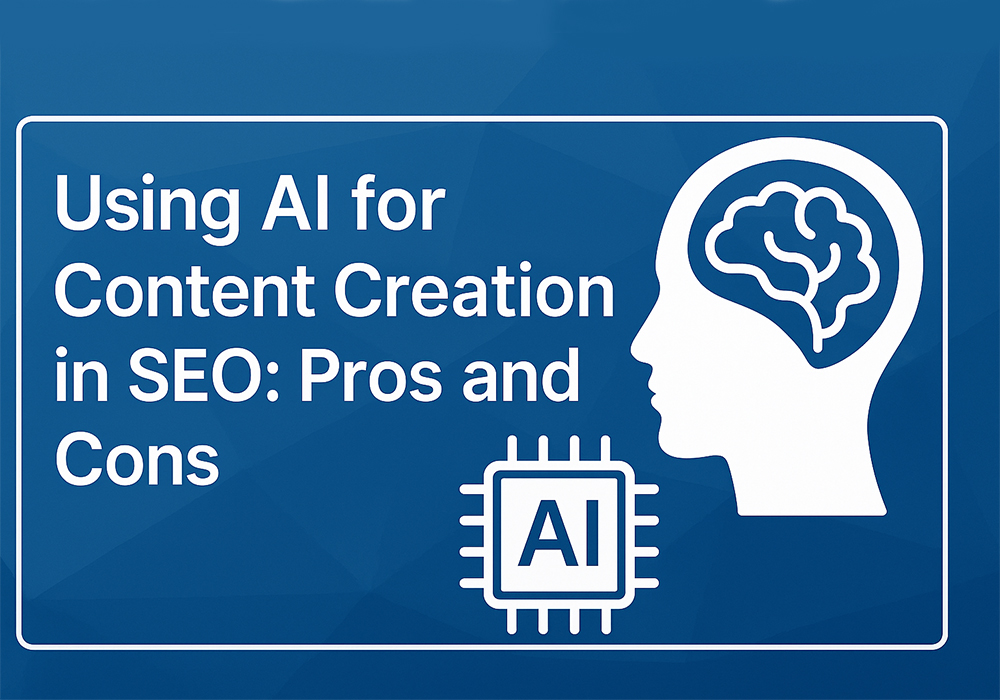Using AI for Content Creation in SEO: Pros and Cons

Companies today proceed with digital marketing differently because the increasing use of artificial intelligence (AI) in content creation is changing everything. Applying artificial intelligence (AI) technologies like ChatGPT, Jasper, and Writesonic to create content strategy—whether writing a blog post or writing social media descriptions—is gaining momentum. While there are many advantages to using AI, it is necessary to keep everything in perspective. We’re going to take into account the pros and cons of using AI to generate content within this article, with a special focus on SEO.
Pros of Using AI for Content Creation
1. Speed and Efficiency
One of the most glaring benefits of AI content tools is how quickly they are able to create content. A blog article that could take a human writer hours to do can be written in minutes by AI. This is perfect for companies that require to churn out large amounts of content on a consistent basis.
2. Cost-Effective
It might be costly for small firms to hire content writers or outsource SEO blogging. AI tools provide a less expensive option. Without the ongoing expenses of a full-time writer, they can assist you in creating drafts, captions, and outlines.
3. SEO Optimization
Many AI platforms are designed with SEO as a top priority. They suggest headings, meta descriptions, keywords, and content architectures based on search engine algorithms. This will help to make sure that your content is readable and will have higher search engine rankings. For a closer examination of SEO in business, read our previous blog post: How SEO Works for Business.
4. Multilingual and Scalable
Businesses may now produce content in several languages thanks to AI, which facilitates worldwide expansion. Moreover, it allows for the reuse and amplification of content on other sites, such as emails, blogs, and social media updates.
Cons of Using AI for Content Creation
1. Lack of Creativity and Emotion
Even while AI can replicate human writing, it still lacks a true writer’s emotional intelligence and inventiveness. It finds it difficult to communicate tone, tell stories, or evoke strong feelings in readers—all of which are essential components of interesting material.
2. Contextual and Factual Inaccuracy
Patterns in the available data are what AI models are based on. This means that they may sometimes generate incorrect or outdated information. Pre-publication fact-checking is therefore important to maintain credibility and trust before AI-generated content is published.
3. Risk of Duplicate or Generic Content
AI frequently creates text by using similar internet wording or patterns. Inadequate editing might lead to redundant or too generic content, which could negatively impact the search engine optimization of your website. Original, superior information produced for people, not just search algorithms, is valued by Google.
4. Brand Voice and Tone Challenges
Every company has a distinct voice. AI might not adequately convey the personality of your brand, particularly whether writing in a formal or conversational style. To match your identity and keep consistency across channels, manual tweaking is frequently necessary.
Finding the Right Balance
AI will not replace human writers but will be used to help them. The optimal content strategy employs AI for writing and structure, supplemented by human editing for creativity, storytelling, and SEO fine-tuning. This maintains content as engaging while fulfilling SEO needs.
If you’re interested in increasing your online presence, incorporating technology with strategic planning is the best approach to advance. For instance, if your company needs professional assistance with SEO optimization or blogging, consider delving into specialized SEO services specific to your objectives.
Final Thoughts
AI is changing the content creation process. It’s quick, smart, and efficient—but it’s not perfect. It doesn’t possess the depth, emotion, and creativity that human writers alone can deliver. Knowing its strengths and weaknesses, companies can use AI to augment, but not replace, their content efforts.